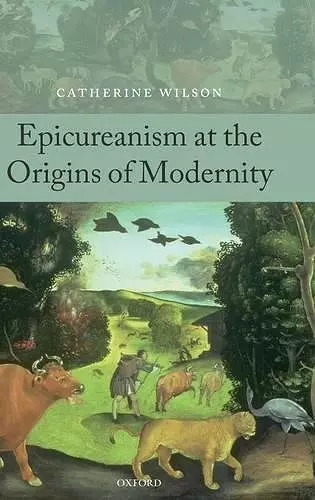Epicureanism at the Origins of Modernity
Format:Hardback
Publisher:Oxford University Press
Published:19th Jun '08
Currently unavailable, and unfortunately no date known when it will be back
This hardback is available in another edition too:
- Paperback£45.49(9780199595556)

This landmark study examines the role played by the rediscovery of the writings of the ancient atomists, Epicurus and Lucretius, in the articulation of the major philosophical systems of the seventeenth century, and, more broadly, their influence on the evolution of natural science and moral and political philosophy. The target of sustained and trenchant philosophical criticism by Cicero, and of opprobrium by the Christian Fathers of the early Church, for its unflinching commitment to the absence of divine supervision and the finitude of life, the Epicurean philosophy surfaced again in the period of the Scientific Revolution, when it displaced scholastic Aristotelianism. Both modern social contract theory and utilitarianism in ethics were grounded in its tenets. Catherine Wilson shows how the distinctive Epicurean image of the natural and social worlds took hold in philosophy, and how it is an acknowledged, and often unacknowledged presence in the writings of Descartes, Gassendi, Hobbes, Boyle, Locke, Leibniz, Berkeley. With chapters devoted to Epicurean physics and cosmology, the corpuscularian or "mechanical" philosophy, the question of the mortality of the soul, the grounds of political authority, the contested nature of the experimental philosophy, sensuality, curiosity, and the role of pleasure and utility in ethics, the author makes a persuasive case for the significance of materialism in seventeenth-century philosophy without underestimating the depth and significance of the opposition to it, and for its continued importance in the contemporary world. Lucretius's great poem, On the Nature of Things, supplies the frame of reference for this deeply-researched inquiry into the origins of modern philosophy. .
By pointing us to the Epicurean flavor of many of the ideas that pervaded seventeenth- and eighteenth-century metaphysics, epistemology, ethics, and natural and political philosophy - Catherine Wilson's work offers a great opportunity to improve our understanding of what was involved in the transformation of Scholastic doctrines into modern philosophy. * Anik Waldow, Journal of the American Academy of Religion *
Wilson's book is learned, judicious, and full of subtle observations. * Eric Schiliesser, Mind 119 d *
lucid and engagingly written... I find the argument entirely compelling... [this] is really a beautiful book. Epicureanism at the Origins of Modernity says true and original things in a pleasing manner. It is worth reading for anyone with even a passing interest in seventeenth-century philosophy. * Antonia LoLordo, Metascience *
- Winner of Winner of the Canadian Philosophical Prize 2009.
ISBN: 9780199238811
Dimensions: 241mm x 164mm x 24mm
Weight: 631g
318 pages